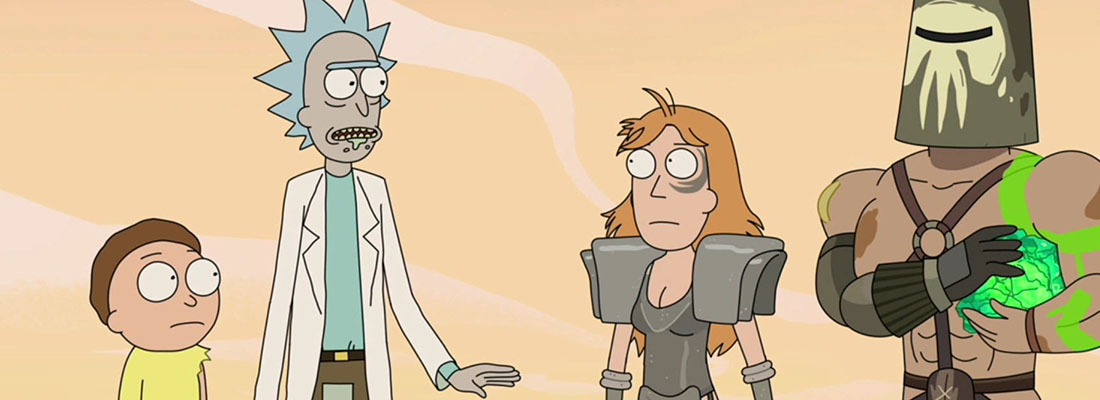One of the things I like about Rick and Morty is that it usually provokes interesting thoughts. Some of these thoughts are weird (for instance, the time I estimated how many testicles would fit in a dump truck), and sometimes they are just interesting (to me, at least). This is the first post of a series where I’ll write about a thought that is related to the most recent episode of Rick and Morty. It isn’t an attempt to review or even analyze the episode – it’s really just an excuse to write about something I find interesting. I hope you find it interesting as well!
The Apocalypse as an Escape
In S3E2, Rick, Morty, and Summer travel to a post-apocalyptic wasteland and find it a nice escape from their troubles at home caused by their parents’ divorce. Summer, in particular, takes to it immediately, embracing the nihilistic death-worship that her new friends follow.
This is really commentary on a popular thought that the modern world is complex and alienating, and an apocalypse would in some ways be a return to a “simpler” time, where the priority is just day-to-day survival. This isn’t the first time Rick and Morty has played with this idea – it was also brought up in S1E6 (“Rick Potion #9”), which ends with a short scene of Jerry, Beth and Summer finally content in a Cronenberg apocalypse.
I am definitely not a sociology expert, and will probably screw this idea up, but to me this idea is kind of like Emile Durkheim’s concept of “anomie.” The term goes back to the book Suicide, which was published in 1897. The basic idea is that technology, the economy, and ways of life can change faster than culture is able to keep up. This leads to unhappiness as the world is mismatched to what people expect. In practice, this means that traditional values and ideologies are overwhelmed by the changing nature of the world, and people suffer as a result. As far as I am aware, Durkheim never talked about zombies or Mad Max, but I think you can see a desire for a “return to roots” of traditional values in apocalypse fantasy.
Ross Douthat, a conservative commentator, made a related point about Game of Thrones:
No, you like it because it lets you escape the flat dreariness of liberalism for a little while. Because deep down you want a king or queen.
— Ross Douthat (@DouthatNYT) July 12, 2017
A lot of progressives disagreed with this pretty forcefully, and I absolutely do not want to say that this is the primary reason anyone else enjoys the show (I’m not a fan of trying to tell other people what they think). But for me personally, I thought it was spot on. The modern liberal world can be kind of dreary – we more or less reject traditional concepts of morality in favor of a broad, cosmopolitan perspective. Cosmopolitanism is good and important. The end of tribalism is crucial to not incinerating each other with nuclear weapons. But as an introspective, self-aware person, I am willing to admit – sometimes you just want to swear allegiance to a king and run his enemies through with a pike. I would never do such a thing, but I find stories that let me see other people do it to be pretty compelling.
A final interesting comparison is with William James’ essay “The Moral Equivalent of War.” Published in 1910, William James makes the case that war is evil and must be avoided, but that to achieve this, pacifists need to find non-violent equivalents that can appeal to the same higher ideals that war brings out in people. While characterizing what he thinks is a common view among military men, he writes:
[fusion_builder_container hundred_percent=”yes” overflow=”visible”][fusion_builder_row][fusion_builder_column type=”1_1″ background_position=”left top” background_color=”” border_size=”” border_color=”” border_style=”solid” spacing=”yes” background_image=”” background_repeat=”no-repeat” padding=”” margin_top=”0px” margin_bottom=”0px” class=”” id=”” animation_type=”” animation_speed=”0.3″ animation_direction=”left” hide_on_mobile=”no” center_content=”no” min_height=”none”][War’s] “horrors” are a cheap price to pay for rescue from the only alternative supposed, of a world of clerks and teachers, of co-education and zo-ophily, of “consumer’s leagues” and “associated charities,” of industrialism unlimited, and feminism unabashed. No scorn, no hardness, no valor any more! Fie upon such a cattleyard of a planet!
Importantly, James did not agree with this sentiment, but I think he was accurate in his characterization of a certain mindset. Today, we talk about “The Greatest Generation,” and we remember their exploits in WWII as a mark of national pride. Both major political parties venerate the military in an almost religious way (although this often fails to translate into actual useful support).
In a world where all-out war between major powers has become almost unthinkably horrific (due to nuclear weapons), I think that Zombie Survival Plans and other forms of apocalyptic fantasy provide an outlet for similar feelings. In our regular lives, we sit around on computers and look at pictures of cats, but deep down a lot of us know that if zombies showed up we would have a chance to really prove ourselves for the survivors we are.[/fusion_builder_column][/fusion_builder_row][/fusion_builder_container]

